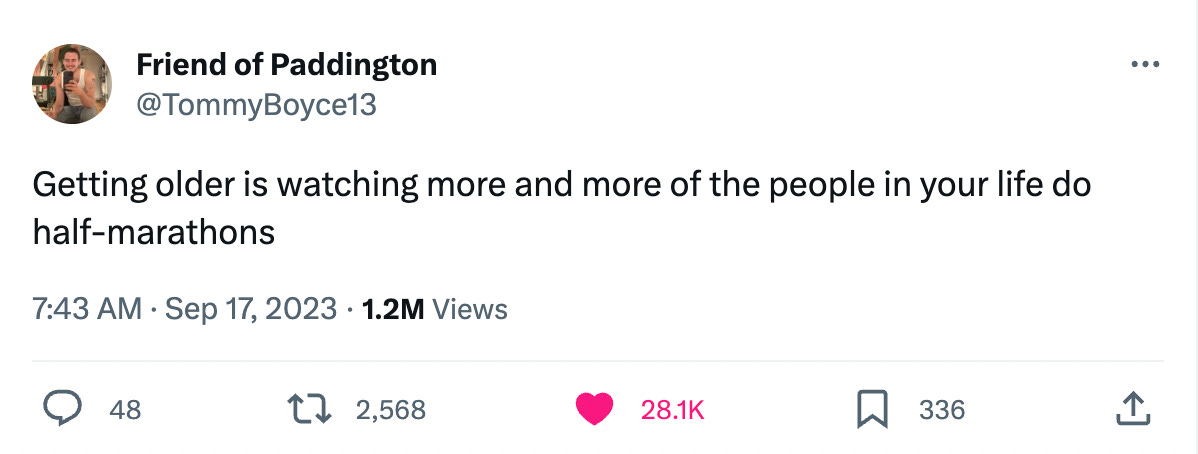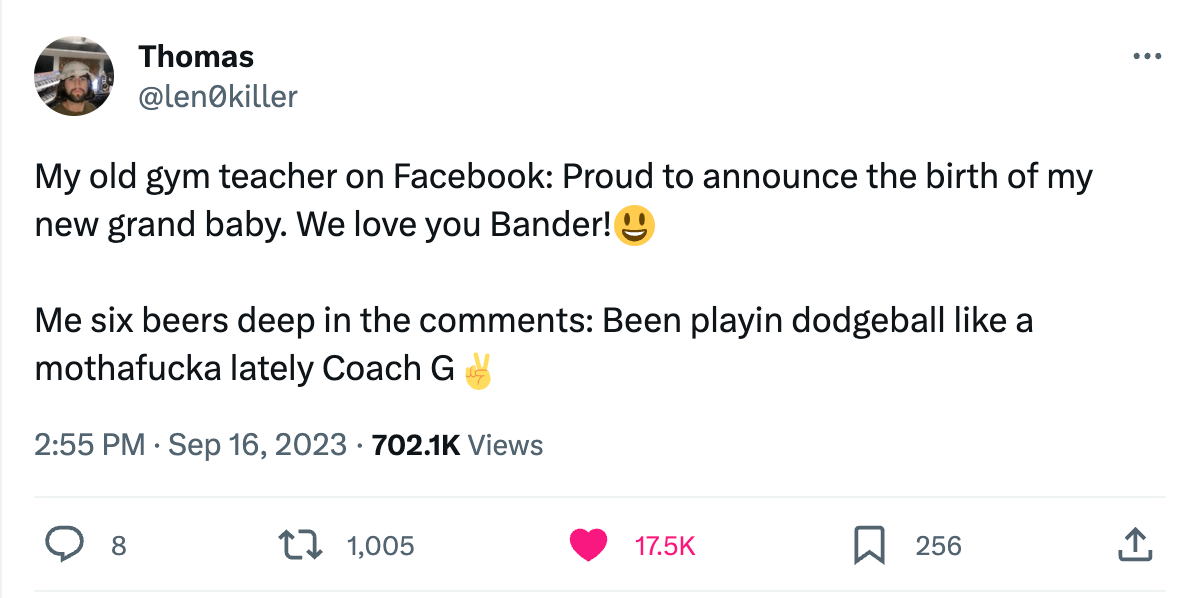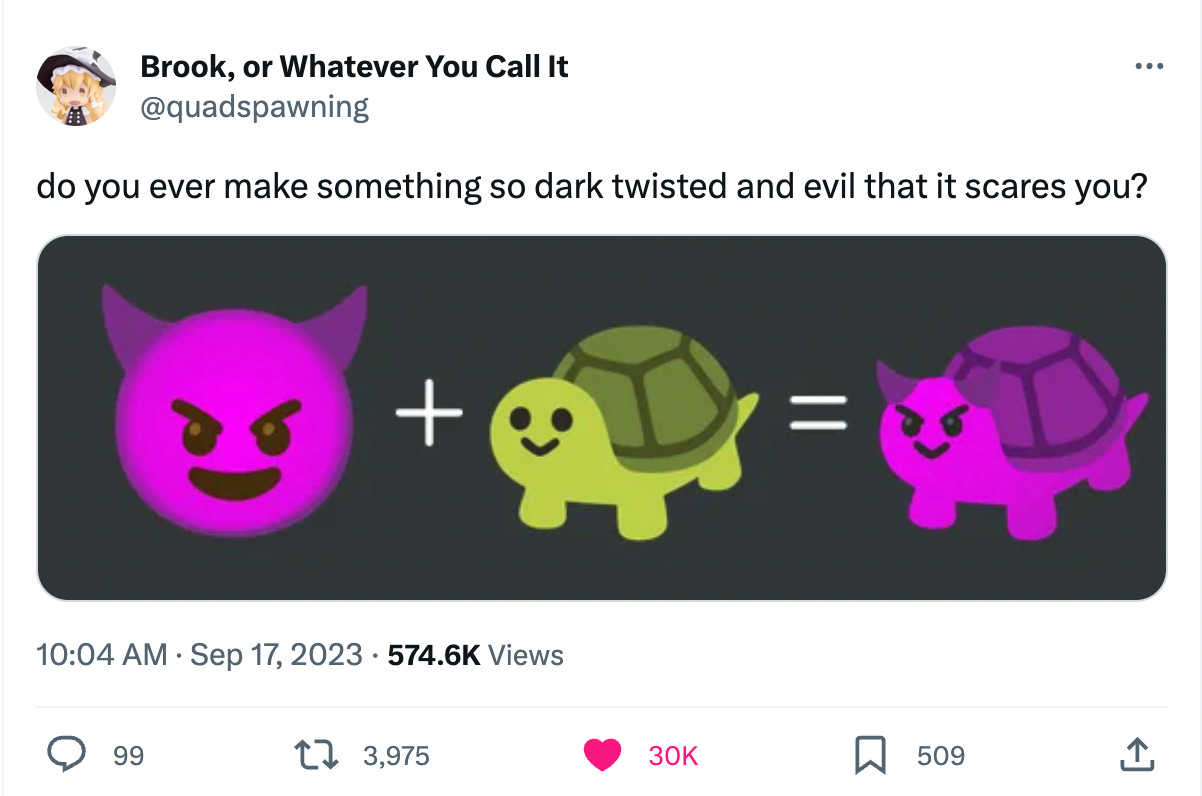What I learned in year three of Platformer
Here’s this week’s free column — a look at some of the most surprising revelations in Walter Isaacson’s new biography of Elon Musk. Do you value independent, ad-free reporting on platforms and global tech policy? If so, maybe kick us ten bucks? It would mean a lot to us. Plus, we’ll email you first with all our scoops — like with our recent look at why the former Twitter may be bracing for an exodus of staffers. ➡️
What I learned in year three of PlatformerHas the Substack revolution come and gone? PLUS: What's changing in year fourI. State of the union Today, on the occasion of Platformer's third birthday, I wanted to take some time to talk about lessons from the past year, my sense of the independent journalist life lately, and how I intend to evolve the newsletter over the next year. (I wrote similar posts at our one- and two-year anniversaries; if you find this sort of navel-gazing self-indulgent, there will be another free edition later this week featuring more outward-facing journalism.) Let's start by talking about how things are going around here. When I last wrote an anniversary post, there were just under 75,000 subscribers to the free edition. A year later, that number has climbed to 155,355 — more than doubling our growth rate over last year. One of the main reasons I write a post like this each year is just to say thank you — especially to the paid subscribers who make this work possible. Together, we've created a tiny media company that punches above its weight. This year, the Online News Association named Platformer a finalist in breaking news and excellence in tech reporting for its annual awards. At a time when the tech news media is shrinking, it still feels invigorating every day to wake up and work for a publication that only exists because thousands of people collectively will it into existence with their subscriptions. We grew for four main reasons. One, the sublimely talented Zoë Schiffer joined as managing editor, and immediately broke a series of stories that attracted thousands of new readers. Two, Elon Musk's chaotic takeover of Twitter — and our ongoing scoops on the fallout — captivated you. Among many other stories, we wrote the definitive day-one story of Twitter’s massive layoffs; told you how Musk created a special system to show people all his tweets first; and shared the story of Elon Musk firing an engineer because views on Musk’s tweets were declining. Three, one of the big projects I announced in my anniversary post last year — the Hard Fork podcast with the New York Times — has also helped us find new readers. New subscribers often write to tell me that they first heard of our work here on the podcast, and I'm really excited to continue exploring how the newsletter and the podcast can continue to support one another. Four, Substack's recommendations engine — which encourages new subscribers to newsletters to also consider subscribing to other newsletters recommended by the author — continues to drive thousands of new signups a month. It's probably the single best feature Substack ever shipped, at least in terms of value created, and Platformer has benefited from it significantly. Why share all this? Partly to brag, sure. But one of the things I am learning about the newsletter business three years in is that to be successful, you need multiple things to go right at once: to have the chance to work with a great partner; to generate scoops at some regular cadence; to create a complementary product that expands your audience; and to leverage whatever platform dynamics you can for as long as they last. II. Where is everybody else? Platformer's success over the past year has been bittersweet, since at the same time the broader tech media ecosystem has been in real pain. Over the past year, we've lost BuzzFeed News, Protocol, and the heart of Vice's Motherboard. Other publications whose articles were once the lifeblood of our links section have shed staffers and a good deal of their vitality. Talented reporters are losing their jobs. In the first-ever Platformer post, I wrote about my intention to mentor writers who were considering the independent path. And for two years, I did, taking calls with writers of all sorts. Some I mentored formally. Others I just kicked around ideas with. In 2020, I was certain that some healthy subset of my peers in the tech press were about to follow me out the doors of their publications onto Substack. In the end, though, almost no one else did. In the three years since, we've learned a lot about what stops writers from striking out on their own. You need to have some money saved up. You need to have a clear product vision. You need to be able to deliver consistently, week after week and month after month. You need to write posts that resonate broadly. You need to find healthcare and avoid burnout. You don't have to have a lot of followers on social media, but it helps. Faced with that list of requirements, it's no surprise that most established journalists would prefer a salaried job. The financial upside is considerably lower. Day to day, though, it feels safer. The thing is — it might not be. Not really. Not in a world where Google search, which still serves as the lifeblood of many publications, might be on the cusp of its most radical change in decades. What the company calls "search generative experience" has already begun to nibble away at the kind of quick-turnaround "what time is the Super Bowl?" style posts and affiliate links that currently fund thousands of reporting jobs around the world. Very few people outside of media understand the degree to which the ecosystem hinges on changes to search results. I'm confident that Google will find ways to continue directing streams of traffic to publishers out of sheer self-preservation — the company already faces an antitrust trial over its monopolistic digital advertising business, and if a handful more large digital media companies collapse in the next two years, regulators will have even more ammunition for their lawsuits. But I don't know anyone who thinks that the terms for digital publishers reliant on search traffic are going to change for the better. And if you're a reporter for one of those publishers, you should assume that the pace of layoffs is going to pick up faster than your boss will be able to create new revenue streams to pay your salary. The defensive reason to strike out on your own, then, is that someday the choice might be made for you. (I won't soon forget the conversation I had earlier this year with a media CEO who, when I asked which publications he thought would survive the disruption from generative AI, would not name more than five.) But there are more positive reasons to strike out on your own, too. You can get started fast. The overhead is low. The email addresses you collect are yours, forever. Every day it becomes more common for the average person to become a paid subscriber to a favorite creator, whether on Twitch or YouTube or TikTok or Substack. And the economics are good: at $10 a month, 1,000 subscribers should pay most of your bills in any city in America. There are more good reasons to consider the independent life. There are a shocking number of unfilled niches in paid newsletters. Where is the scoopy daily newsletter about Amazon, or streaming TV, or short-form video? What about AI in education, or AI in marketing, or AI in law? For a good enough reporter, any one of those is a six-figure job just waiting to be claimed. And if you do claim it, subscription revenue doesn't have to be your sole source of income. You might also create a podcast, take some paid consulting calls, or do some public speaking. You could get a contributor deal with a TV network, or write a book. The newsletter can be the hub, but it can support multiple spokes. Admittedly, all of this takes an entrepreneurial spirit that doesn't come naturally to most reporters. (It didn't to me.) And in some ways it really is harder to start your own publication today than it was in 2020 — there's more competition for subscription dollars, for one. And thanks to the death of Twitter, it's harder to promote your work: you wind up posting the same link to five or six new networks, and collectively get a tenth of the views that a year ago you could have gotten on the bird site. But lately, wherever I go, I'm telling everyone from the youngest journalism students to the most established veterans to start a little newsletter. You only have to send it out a few times a year if you want, I tell them. Just email friends links to your stories. Maybe throw in a few thoughts about your beat, or links to other things you thought were interesting. And let that list grow over time. The point isn't to start a full fledged publication. At least, not right away. The point is to collect email addresses. Because in many of the best cases — you got a book deal, for example — you are going to want them. And in all of the worst cases — you were just laid off — you are going to need them. In a challenging year, I have been heartened by all the journalists that I do see taking this path. I am endlessly impressed by Defector Media (and their amazing podcast, Normal Gossip); by Casey Johnston of She’s A Beast; by PJ Vogt and Search Engine; by the upstarts at 404 Media. And I also want to acknowledge that many of the most successful newsletters come from writers who have non-journalism backgrounds. The top tech publication on Substack, for example, is Gergely Orosz’s Pragmatic Engineer, which brings a daunting amount of original, actionable reporting to every edition. One possibility for the future of media is that it is built by people who never expected to find themselves working in media. III. What's next So that's my sense of where we are. Where do we go from here? When I started Platformer, I pitched it as a tiny media company. When reporters asked me if I wanted to build a traditional newsroom, I told them that I envisioned something more like a Scooby gang: five or so people, working together to break news and write smart analysis about tech platforms and the future. Last year, we became two. This year, we become three: I'm excited to announce that Lindsey Choo has joined us in a part-time role. While I hand-pick all the links that you see in each newsletter, and take an editing pass on everything below the column, Lindsey will be helping to organize and summarize the day's top stories. This will give Zoë and me more time to report and write, as well as to work on various other Platformer projects. Two of those projects I can tell you about today. One is that over the next year or so, I want to explore bringing on another senior journalist to expand our reporting firepower. Maybe it's a person who can go deep on our core beat companies — Meta, Google, X, TikTok, and Snap — and write newsworthy columns with me in this space. Or maybe it's someone who covers a slightly more orthogonal beat, but would make sense in a Platformer bundle: a standalone newsletter that builds its own audience over time, but is included with the cost of Platformer. The goal is to reverse the trend I described above: the slow bleeding of talent out of the journalism industry. I want to bring the intensity to which we covered the Twitter story last year and turn it to the most pressing issues of the future: the disruption of AI, the rapid erosion of privacy, the threats to online speech, and the murky future of virtual and augmented reality. Adding a top-notch reporter to our team could meaningfully accelerate our ability to do that. That brings me to the second project I want to mention. Over the next year, Platformer is going to experiment with putting ads in the newsletter. Platformer was designed so that most people never have to pay us in order to benefit from our journalism. But at the moment, around 95 percent of our audience falls into this category. And while the generosity of our paid readers has allowed us to grow revenue well beyond my expectations, the limits of the subscription model mean that at our current rate we would likely never be able to bring on another journalist. Ever since the newsletter began, we've gotten inquiries from advertisers about inserting ads into the newsletter. We briefly experimented with a jobs board last year, but discontinued it for lack of interest. This year, we want to see whether we can build a meaningful ad business that could support another journalism job. I'm the sort of person who pays to remove ads when I can, and so I promise you that we are going to move very cautiously here. We'll start with one ad in the weekly free edition and see how it feels. It will take us some time to ramp up — we need to publish an ads policy, for example, and chat with potential sponsors — but if you have thoughts on the subject in the meantime, let us know. (Especially if you want to advertise!) Finally, I continue to think about what else I and Platformer can do to support independent journalism. Maybe someday the newsletter begins making small, angel-style investments in promising journalists who want to start their own businesses. Or maybe we work with a sponsor or a philanthropy to do something similar, and instead of an investment, it's a grant. I have thought about the best way to do this for over a year, and usually at the end I find that I have basically just reinvented Substack. So I still have some more thinking to do. We have a lot more coming this year — we just can't tell you about it quite yet. In the meantime, thank you to everyone who has read our posts, shared them with friends, and become paid subscribers. Three years in, Platformer continues to be the best job I've ever had. Together, here's hoping we can all figure out how to make independent journalism a great job for lots of other folks, too. Governing
Industry
Those good postsFor more good posts every day, follow Casey’s Instagram stories. (Link) (Link) (Link) Talk to usSend us tips, comments, questions, and reporter candidates: casey@platformer.news and zoe@platformer.news. By design, the vast majority of Platformer readers never pay anything for the journalism it provides. But you made it all the way to the end of this week’s edition — maybe not for the first time. Want to support more journalism like what you read today? If so, click here: |
Older messages
The FTC takes aim at X
Sunday, September 17, 2023
Company documents reveal how a stalled data deletion project and inadequate data protections could put X in the agency's crosshairs
Nine wild details from the new Elon Musk biography
Wednesday, September 13, 2023
Walter Isaacson brings new tales of Jack Dorsey, that Sergey Brin selfie, and more
Google goes to court
Friday, September 8, 2023
On the eve of a major antitrust trial — and its 25th birthday — the company is bracing for a fight
The unbearable slowness of Meta's Oversight Board
Wednesday, August 30, 2023
A 234-day wait to get a ruling in a case about incitement to violence suggests that something important is broken
Why note-taking apps don't make us smarter
Friday, August 25, 2023
They're designed for storage, not sparking insights. Can AI change that?
You Might Also Like
Be objective, not detached
Wednesday, March 5, 2025
Context isn't only about facts and what happened--it's also helping your audience understand how to interpret this information. ͏ ͏ ͏ ͏ ͏ ͏ ͏ ͏ ͏ ͏ ͏ ͏ ͏ ͏ ͏ ͏ ͏ ͏ ͏ ͏ ͏ ͏ ͏ ͏ ͏ ͏ ͏ ͏ ͏ ͏ ͏ ͏ ͏
1️⃣ 0️⃣ These sourcing strategies are easily worth $10k
Wednesday, March 5, 2025
You get it for free from Kian Golzari, who's the secret weapon of world-famous brands... Hey Friend , If you're struggling to find a factory that delivers great quality, fair pricing, and good
Europe’s biggest tech takeovers
Wednesday, March 5, 2025
+ brunch with Eileen Burbidge, cheating founders View in browser Vanta_flagship Author-Mimi by Mimi Billing Good morning there, When news broke last Friday that Microsoft is closing down Skype, it
How’s that little project going?
Tuesday, March 4, 2025
Read time: 1 min. 2 sec. It's 2017. I've been grinding on Starter Story for months. Blood! Sweat!! Tears!!! (okay, not actual blood, but you get it) I'd put in the hours. Built the thing.
How to build a $10M ARR B2B AI Startup
Tuesday, March 4, 2025
How I'd get to $10m ARR ͏ ͏ ͏ ͏ ͏ ͏ ͏ ͏ ͏ ͏ ͏ ͏ ͏ ͏ ͏ ͏ ͏ ͏ ͏ ͏ ͏ ͏ ͏ ͏ ͏ ͏ ͏ ͏ ͏ ͏ ͏ ͏ ͏ ͏ ͏ ͏ ͏ ͏ ͏ ͏ ͏ ͏ ͏ ͏ ͏ ͏ ͏ ͏ ͏ ͏ ͏ ͏ ͏ ͏ ͏ ͏ ͏ ͏ ͏ ͏ ͏ ͏ ͏ ͏ ͏ ͏ ͏ ͏ ͏ ͏ ͏ ͏ ͏ ͏ ͏ ͏ ͏ ͏ ͏ ͏ ͏ ͏ ͏ ͏ ͏ ͏ ͏
[CEI] Chrome Extension Ideas #180
Tuesday, March 4, 2025
ideas for Figma, GitHub, Job Applicants, and stud ͏ ͏ ͏ ͏ ͏ ͏ ͏ ͏ ͏ ͏ ͏ ͏ ͏ ͏ ͏ ͏ ͏ ͏ ͏ ͏ ͏ ͏ ͏ ͏ ͏ ͏ ͏ ͏ ͏ ͏ ͏ ͏ ͏ ͏ ͏ ͏ ͏ ͏ ͏ ͏ ͏ ͏ ͏ ͏ ͏ ͏ ͏ ͏ ͏ ͏ ͏ ͏ ͏ ͏ ͏ ͏ ͏ ͏ ͏ ͏ ͏ ͏ ͏ ͏ ͏ ͏ ͏ ͏ ͏ ͏ ͏ ͏ ͏ ͏ ͏ ͏
500k subs & 7 figs in revenue
Tuesday, March 4, 2025
This founder was still in college when he sold the business ͏ ͏ ͏ ͏ ͏ ͏ ͏ ͏ ͏ ͏ ͏ ͏ ͏ ͏ ͏ ͏ ͏ ͏ ͏ ͏ ͏ ͏ ͏ ͏ ͏ ͏ ͏ ͏ ͏ ͏ ͏ ͏ ͏ ͏ ͏ ͏ ͏ ͏ ͏ ͏ ͏ ͏ ͏ ͏ ͏ ͏ ͏ ͏ ͏ ͏ ͏ ͏ ͏ ͏ ͏ ͏ ͏ ͏ ͏ ͏ ͏ ͏ ͏ ͏ ͏ ͏ ͏ ͏ ͏ ͏ ͏
1,000,000
Tuesday, March 4, 2025
Taking a moment to celebrate and reflect—and then back to work ͏ ͏ ͏ ͏ ͏ ͏ ͏ ͏ ͏ ͏ ͏ ͏ ͏ ͏ ͏ ͏ ͏ ͏ ͏ ͏ ͏ ͏ ͏ ͏ ͏ ͏ ͏ ͏ ͏ ͏ ͏ ͏ ͏ ͏ ͏ ͏ ͏ ͏ ͏ ͏ ͏ ͏ ͏ ͏ ͏ ͏ ͏ ͏ ͏ ͏ ͏ ͏ ͏ ͏ ͏ ͏ ͏ ͏ ͏ ͏ ͏ ͏ ͏ ͏ ͏ ͏ ͏ ͏ ͏
BSSA #116 - Outsourcing to scale 🚀
Tuesday, March 4, 2025
March 04, 2025 | Read Online Hello everyone! The Wide Event is almost sold out. More than 90% of the tickets have been booked. If you're one of the people waiting until the last minute to purchase,
🔥 The secret factories big brands don’t want you to know 👗👖
Tuesday, March 4, 2025
The best fashion suppliers don't advertise—here's how to find them. Hey Friend , If you've ever struggled to find high-quality fashion manufacturers, there's a reason: The best




